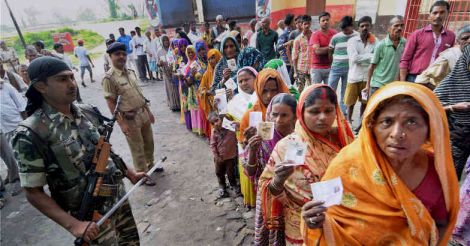The Assembly election in Bihar in 2015 started with outsiders blaming the DNA of Bihar. Union Minister Nitin Gadkari accused that caste was ingrained in the DNA of Biharis. Soon after that, Prime Minister Narendra Modi spotted problems in the DNA of Bihar Chief Minister Nitish Kumar.
Naturally, Nitish and Lalu, the opponents of the NDA, unleashed a campaign storm saying that such remarks were an attack on the pride of Biharis. Now the outsiders don’t even utter the word DNA.
I, another outsider, landed in Patna after a gap of about two years. In a short while, I realised that my long stay in Bihar had transformed my DNA. Unable to resist the call of those genes, I walked spontaneously into a lane behind Vaidyanath Bhavan, which is near Patna railway station.
A shop there is famous for litti-chokha, a dish that could be called the national food of Bihar. The pang of nostalgia that I had reined in for two years subsided only when I ate coal roasted wheat balls filled with spicy gram flour with a roasted brinjal curry. I saw my old friends from Danapur like Muhammad Akram among enchanted customers. Amidst cracking jokes and renewing acquaintances, I asked about the election.
They changed the subject. Some fell silent. I did not find anything unusual: why should elections come in between them and litti-chokha? But when they maintained silence at many instances, I felt that it was political.
Patna has changed completely. Construction work that was under way when I was leaving has been completed. Station Road, which used to be chock-a-block, now has three flyovers that are kilometres long. A flyover on Bailey Road, the congested lifeline of Patna, takes people to Danapur, a nearby town.
Nitish Kumar has done more wonders. Four official residences on Bailey Road were demolished and Bihar Museum, covering 2.25 lakh square feet, was built on that 13.5 acres. Its consultant was Lord Cultural Resources of Canada, a world-famous designer of museums. The history of Bihar, which was the history of India 2,000 years ago, will be shown there. Nitish did not build only cities: schools, roads, bridges, anganvadis and many others were also built in villages during his rule.
The final stage of Lalu Prasad Yadav’s 15-year-long rule was termed jungle raj. Then Patna, where women travel at night on scooters today, used to shut down at 7pm.
The government, which was weakened following the fodder scam, was revived by Nitish.
After all this, why did Nitish join hands with Lalu? In the 2014 Lok Sabha election, Nitish had contested without Lalu. In that election, which was swept by the NDA, Nitish’s place was even behind the UPA, which included Lalu.
The dominance of upper castes in Bihar, which lasted until 1990s, was shattered by Lalu and other leaders who were inspired by Lohia. Historically, it was not a good development.
In places like Kerala and Maharashtra, this mission was undertaken by sagely people like Sree Narayana Guru and Jyotiba Phule. But in Bihar this change was brought by politicians greedy for power.
After non-Congress political forces gained strength, there is no leader in north India (from Mulayam Singh Yadav, Naveen Patnaik and Mamata Banerjee to even Nitish Kumar) who has not slept with the BJP, except Lalu. His secular credentials attract Muslims, and together with his community, the Yadavs, they account for a third of Bihar’s voters.
Rural areas make up 90 per cent of Bihar, where 77 per cent people have no toilet, 84 per cent have no electricity, 90 per cent cook food using wood, kerosene or dung patties, and 54 per cent live in sheds covered with grass or hay. The outcome of this election will be decided in these places, and not in Patna and other cities, which are prominently featured by TV channels and newspapers.
Social scientists say that caste is at the core of every Bihari. And he has always been an Indian to the core. From the sepoy rebellion of 1857 to the emergency of 1977, the people who fought to liberate India were these illiterate villagers of Aryavarta.
The Bihari identity began to form during the rule of Nitish. First caste, then the concept of India and now the recently sprouted Bihari pride – this election is taking place in extremely complex circumstances.





































































































































































































































































































































































































































































































































































































































Disclaimer
The comments posted here/below/in the given space are not on behalf of Manorama. The person posting the comment will be in sole ownership of its responsibility. According to the central government's IT rules, obscene or offensive statement made against a person, religion, community or nation is a punishable offense, and legal action would be taken against people who indulge in such activities.